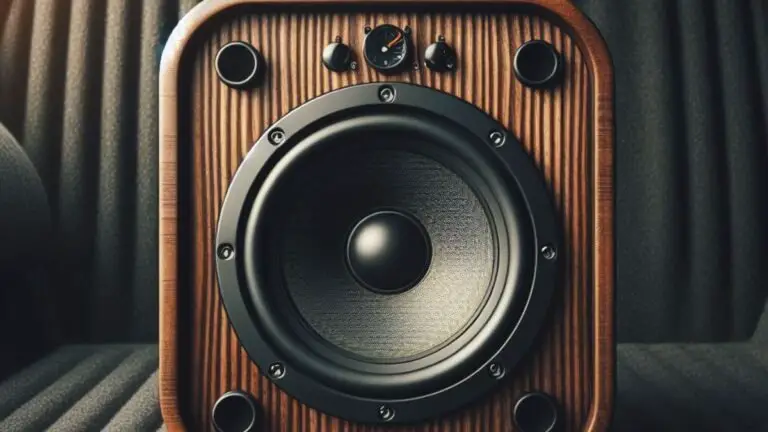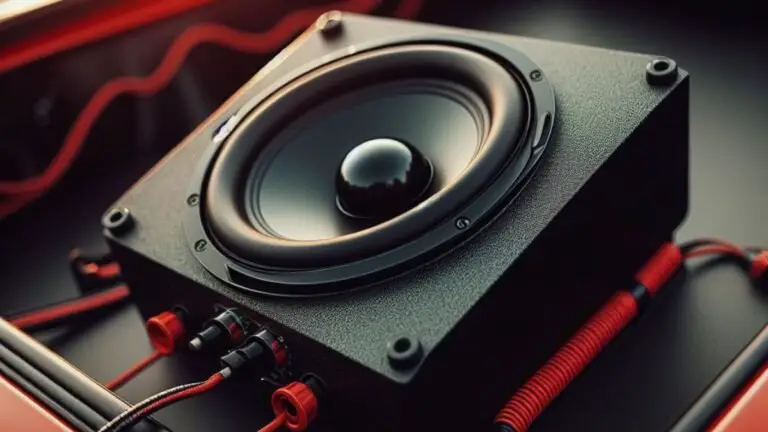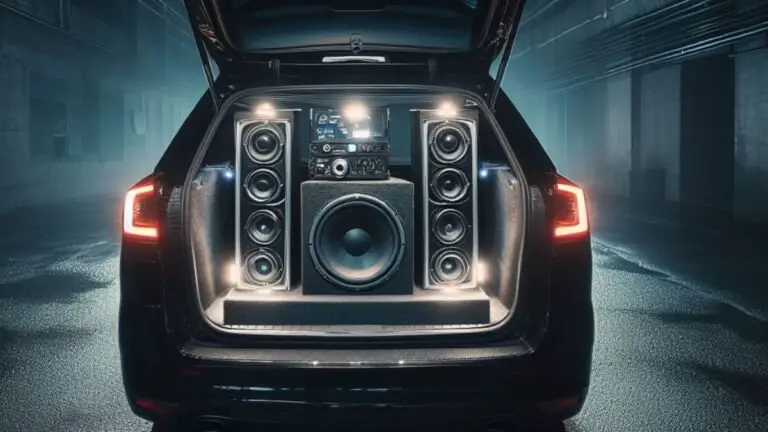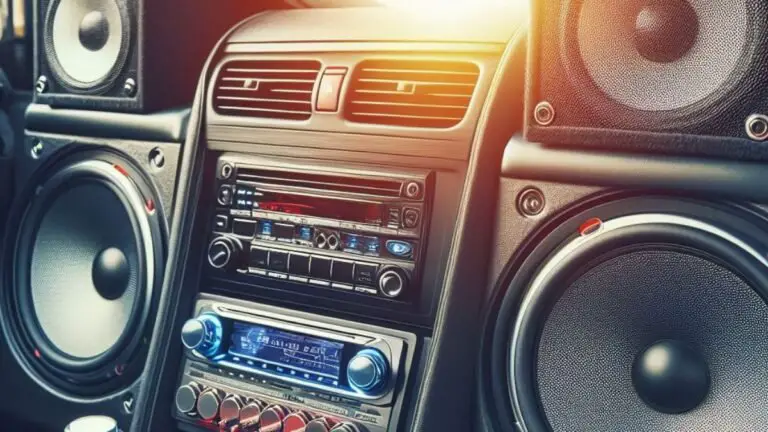Why Are My Car Speakers Crackling?
Have you ever faced a situation when you are driving in beautiful weather and listening to your favorite music and suddenly hear a crackling noise from your car speakers? I know this is really irritating.
Most of us like to listen to music in a very loud voice while driving and car speakers can deliver very noisy music due to some faults. You may be curious about why are my car speakers crackling.
Car speakers can mostly crackle due to the bad connection between the amplifier and the speakers. Another important reason is that when speakers are powered by a very powerful speaker, then in the result, cones try to move beyond their limit.
In this article, we have covered everything from the reasons for the crackling to the solution. You will get to know what measures to follow to keep your speaker in good condition. You will easily understand how to manage this issue in an effective way.
So let’s get into the article and learn about dealing with this issue in detail and in a simple way!
Why do Brand New Car Speakers Crackle?

When you get new speakers for your car to make the music sound better, it can be kind of annoying if they start making crackling sounds. Even though you’re excited for better music, these weird noises can happen for different reasons.
When you buy the new speakers, they need some time to adjust to the settings, so they might crackle during that period. New speakers have some additional things in them which will go away after some time.
There can be very few defects in the car speakers, but if your speaker has some issue, you need to fix it. You have to make your amplified and speaker connection strong to avoid cracking noise.
Knowing about these things can help you enjoy your new and improved car audio without any annoying interruptions.
Main Causes of Why Your car speakers are crackling
Navigating the intricate world of car audio, crackling speakers emerge as a persistent woe for enthusiasts. Understanding the root causes is pivotal for an uninterrupted auditory experience. Let’s unravel the mysteries behind the crackling symphony:
1. Electrical Fields Interference:
Sometimes, electric things messing with your car’s music can make it sound weird with crackling noises. You need to protect the important parts of your music system and make sure the wires are connected properly to solve the issue.
2. Antenna Electromagnetic Interference:
When antenna signals are messing with the audio system, this crackling noise can be produced. To fix this, you need to make sure the antenna is connected to the ground properly.
This helps to stop the interference and makes sure your system works without any annoying disturbances.
3. Loose Wires:
This issue seems simple but it is important because loose wires affect the flow of audio signals. So, make sure that all the cable connections are properly secured to prevent such audio disruptions.
4. Rusty Ignition:
If there is any rust in the ignition system, then it can produce unwanted noise noise into the audio system and lead to crackling. If you want to prevent this from happening, regular maintenance of the ignition system is important.
5. Poor Grounding:
If your electrical system of speakers is not properly grounded, it can also lead to bad audio quality. It’s important to properly ground the car’s electrical system to minimize such disruptive sounds.
6. Car Noise:
The external noise can also lead to noise in the speakers such as the car’s engine noise and road traffic noise. For this issue, you can take some steps to add soundproofing materials to your car to avoid these extra noises.
7. Bass Boosted Music:
Too high bass levels can push speakers beyond their intended limits, which can result in distortion and static noises. So you should maintain a balanced audio setup that aligns with the speaker’s capabilities to prevent damage.
8. Blown Out Speaker:
When a speaker is pushed beyond its limits, it can suffer damage, leading to continued crackling. If you stay within the proper seating and limits of the speakers, you can minimize this noise to a great extent.
9. Faulty Power Supply:
When the power supply is not steady, it can make unwanted noise in the audio system and can cause crackling sounds. To stop this, it’s really important to have a power source that’s always consistent and clean.
Make sure that your system gets the right kind of power to prevent this type of interference and keep your audio free from annoying crackling.
10. Dust and Dirt Buildup:
There can be too much dust gathered on the speakers and the related equipment, which can compromise the sound quality. Regular cleaning routines become important to maintain the best speaker function and audio quality.
11. Moisture and Corrosion:
When moisture and corrosion build up in the wiring and connectors, it can also lead to crackling noise in the car speakers. So it’s good to protect the sensitive components from these things to make sure your audio system works well.
You can also read- How to Get Rid of Static Noise in Car Speakers?
How to Fix Car Speakers Crackling? Preventing Speaker Crackling
Step 1: Check the Speaker Cables

The first step in resolving crackling issues is to check the speaker cables. Make sure that they are securely connected from the amplifier or radio to the speakers. Any loose or damaged cables can disrupt the signal flow, which can eventually lead to crackling sounds.
Step 2: Use High Pass Filters

You can think about using high pass filters for all car speakers can effectively address crackling. These filters allow only higher-frequency audio signals to pass through and stop the low-frequency audio which often results in distortion and crackling.
Step 3: Install a Noise Filter

It’s also a good idea to install a noise filter in your car’s audio system. These filters help remove any unwanted electrical interference that can lead to crackling. You can place the noise filter between the head unit and the amplifier to effectively reduce or clear the disturbing sounds.
Step 4: Adjust Bass Levels

Fine-tune your audio settings by reducing the bass at high volumes and increasing it at lower volumes. After this adjustment, the speakers are not pushed for a louder sound that is beyond their capacity. This eventually reduces the risk of distortion and crackling during louder audio playback.
Step 5: Avoid Bass-Boosted Music

Don’t listen to bass-boosted music, as excessively boosted bass levels can push speakers to their limits, causing distortion and crackling. You must get a balanced audio source to preserve the integrity of your speakers and enjoy a clearer sound.
By following these steps, you can systematically fix and address the factors contributing to crackling in your car speakers.
Does Crackling Sound Mean My Car Speakers are Blown?

If you are facing a crackling sound in your audio system, this does not really mean that your car speakers are blown. But it is a sign that there is some disturbance or issue in your audio setup. While a blown speaker can produce crackling noises, other factors may also cause this undesirable sound.
Loose or damaged wiring, interference from electrical fields, or issues with the audio source can also result in crackling. To determine if your car speakers are blown, you can check them in detail.
A blown speaker often produces distorted sound, diminished audio quality, or even complete silence in extreme cases. If you observe these symptoms alongside the crackling, it is recommended to do some further research.
you must check for visible damage to the speaker cone, inspect the wiring for any issues, and make sure that the speaker is receiving an appropriate power supply.
Can Crackling Damage My Car Speakers?
1. Loose or Damaged Wiring:
Crackling in the car speakers is a very annoying thing and it can also damage the audio system. One main culprit is loose or damaged wiring.
When the electrical connections are compromised, it results in impedance, leading to audio distortion and crackling. If left unattended, this issue can escalate and inflict permanent damage on your car speakers.
2. Blown Speakers:
Another risk related to crackling is the possibility of blown speakers. If you notice crackling that is followed by popping sounds, it could be seen that the speaker cone is damaged.
This typically occurs when the speaker is exposed to power levels that are higher than its capacity, causing overheating and, ultimately, speaker failure. So you must take quick action to avoid damaging your system.
3. Audio System Malfunction:
Crackling can also be a sign of a big issue in your car speaker system. If there is any problem in the amplifier or head unit, it can also contribute to distorted sounds.
If you ignore these issues, it can not only affect the speaker but can also cause serious damage to the audio setup.
You must maintain it regularly and take proper action for any problem to make your car audio setup last longer and work best.
Should I replace all my speakers if one is crackling?

Replacing all your speakers may not be necessary if only one is crackling. First, you need to figure out the specific issue that is the cause of crackling such as loose wires, interference, or a damaged speaker cone.
If the problem lies solely with one speaker, it’s important to deal with that specific issue to save time and cost. However, if multiple speakers show signs of damage or aging, then upgrading the complete setup would be a good option.
A targeted approach based on the specific issue will likely prove more economical than a wholesale replacement of all speakers.
Thinking of getting a new speaker? Then check out- What Speakers Fit My Car?
Can a Damaged Voice Coil Cause a Crackling Noise?
Yes, a damaged voice coil in a speaker can indeed cause a crackling noise. The voice coil is an important component that is responsible for converting electrical signals into sound vibrations.
When the voice coil becomes damaged, whether due to overheating, excessive power, or physical wear, it can result in irregular movement and misalignment of the speaker cone. This can lead to distortion and unwanted crackling sounds during audio playback.
If you suspect a damaged voice coil, it’s advisable to address the issue properly. You can either repair or replace it to restore the speaker’s functionality and maintain audio quality.
How to Prevent Speaker Damage? Car Speaker Maintenance Tips
By adopting the following precautions, you can protect your audio investment and enjoy a consistently high-quality listening experience on the road.

1. Appropriate Amplifier Matching: You must make sure that the amplifier and the speakers are compatible with each other. Avoid overpowering your speakers, as this can lead to overheating and, ultimately, damage.
2. Mindful Volume Control: Donbt listens to very high-volume music for a long time because it can affect the audio system and cause distortion and damage.
3. Bass Management: While bass adds depth to your audio experience, too high bass levels can strain speakers. You can use the vehicle’s equalizer settings to balance bass frequencies and prevent distortion.
4. Adequate Speaker Wiring: Make sure that the wiring of the speaker is correctly installed and is free from damage. Proper wiring prevents signal interruptions and safeguards against issues like short circuits.
5. Temperature Considerations: Speakers are sensitive to high temperatures. Don’t install speakers in areas that are exposed to direct sunlight or extreme heat, as this can impact performance and contribute to wear and tear.
6. Shielding from Moisture: Moisture and humidity can lead to corrosion and damage. If possible, you must shield your speakers from direct exposure to moisture, especially in areas prone to rain or high humidity.
FAQs
Q: How do I fix the crackling sound on my speakers?
To address crackling, it’s important to check wired and wireless connections, adjust volume levels, inspect components, and keep speakers clean. You can check the manufacturer’s guide for specific troubleshooting steps.
Q: How do I stop my car speakers from making static noise?
Make sure that the wiring connections are secured, and there is no wireless interference, adjust audio settings, and inspect components for damage. Regular maintenance can prevent static noise issues.
Q: Why are the speakers in my car cracking?
Cracking may be due to factors like damaged connections, old wires, interrupted signals, high volume or bass, outdated or damaged speakers, faulty voice coils, mismatched amplifier power, deteriorated foam, manufacturing defects, or poor-quality source material. We have talked about the main causes with their solutions in the above sections as well.
Q: How do I know if I need new car speakers?
You can buy new speakers if your speakers have persistent crackling, distorted sound, or visible damage. Upgrading to high-quality speakers can enhance audio performance, providing a clearer and more enjoyable listening experience.
Conclusion
In conclusion, while there are many reasons why your car speakers crackle, there are different solutions for them as well. If there is a need to buy a new setup then go ahead. But mostly, there are little issues in the system which can be easily fixed.
So the above guide has answered all the important queries and is the solution for different problems. Now you know better how to deal with these issues using simple guidelines. So go ahead and make your driving experience enjoyable again.
So hopefully, this guide on, “Why are my car speakers crackling?” was very helpful and you learned a lot from it. You can handle these issues easily and make your audio system of high quality again.
Happy Journey!







